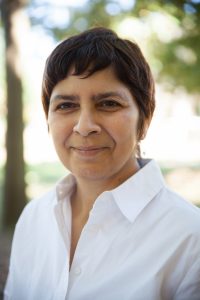
The IAH supports its mission through its Faculty Fellows Program; by sponsoring conferences, lectures, and public conversations. The Institute trains and supports current and emerging university leaders through the Academic Leadership Program. The Institute promotes community through its Faculty Programs that build mentoring networks for faculty at all stages of their academic careers.
Specialization: Economic Development
mtewari@unc.edu
207 New East
919-962-4758
Accepting PhD students
Dr. Meenu Tewari works on the political economy of economic and industrial development, poverty alleviation, small firms, and the urban informal economy from a comparative, institutional perspective. She teaches in the areas of economic development, historical and institutional analysis of development processes, and microeconomics.
Dr. Tewari’s research focuses on comparative local economic development, and upgrading and adjustment in developed and developing countries. She is particularly interested in the implications of global competition for firms, workers, public sector institutions, and local economies, as well as the prospects for upward mobility in regions that are restructuring. Her research explores why, and under what conditions, are some regions, firms, workers, and institutions more able to deal resiliently and innovatively with the pressures of globalization than others; and what kinds of institutional arrangements and circumstances help diffuse these capabilities widely within the regional economy.
Dr. Tewari is a member of the Research and Advisory Committee of the Institute of Small Enterprise Development in India and has served as a consultant with the United Nations Industrial Development Organization, the World Bank, International Labor Organization, the Asian Development Bank, and the Inter-American Development Bank. She taught at MIT from 1997 to 1999 as a lecturer in Economic Development and Urban Planning. Prior to that, she was a post-doctoral fellow at the IFO Institute for Economic Research in Munich, Germany.